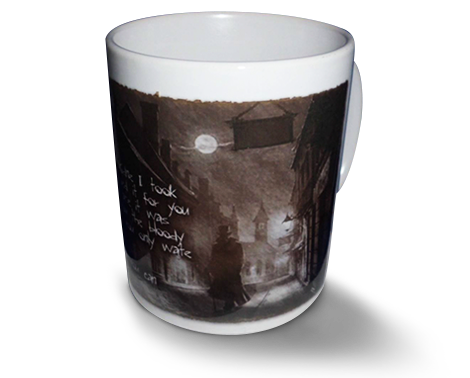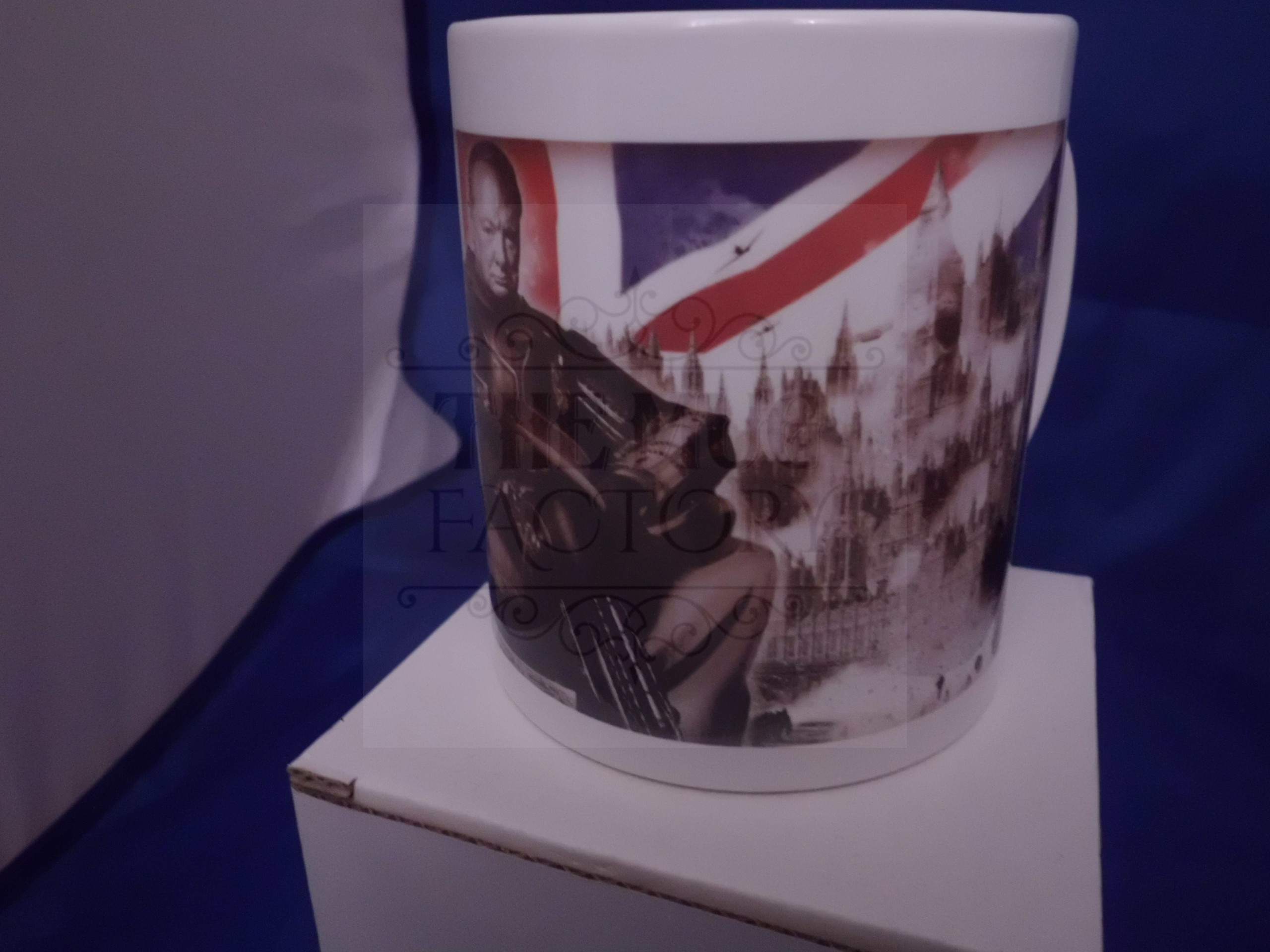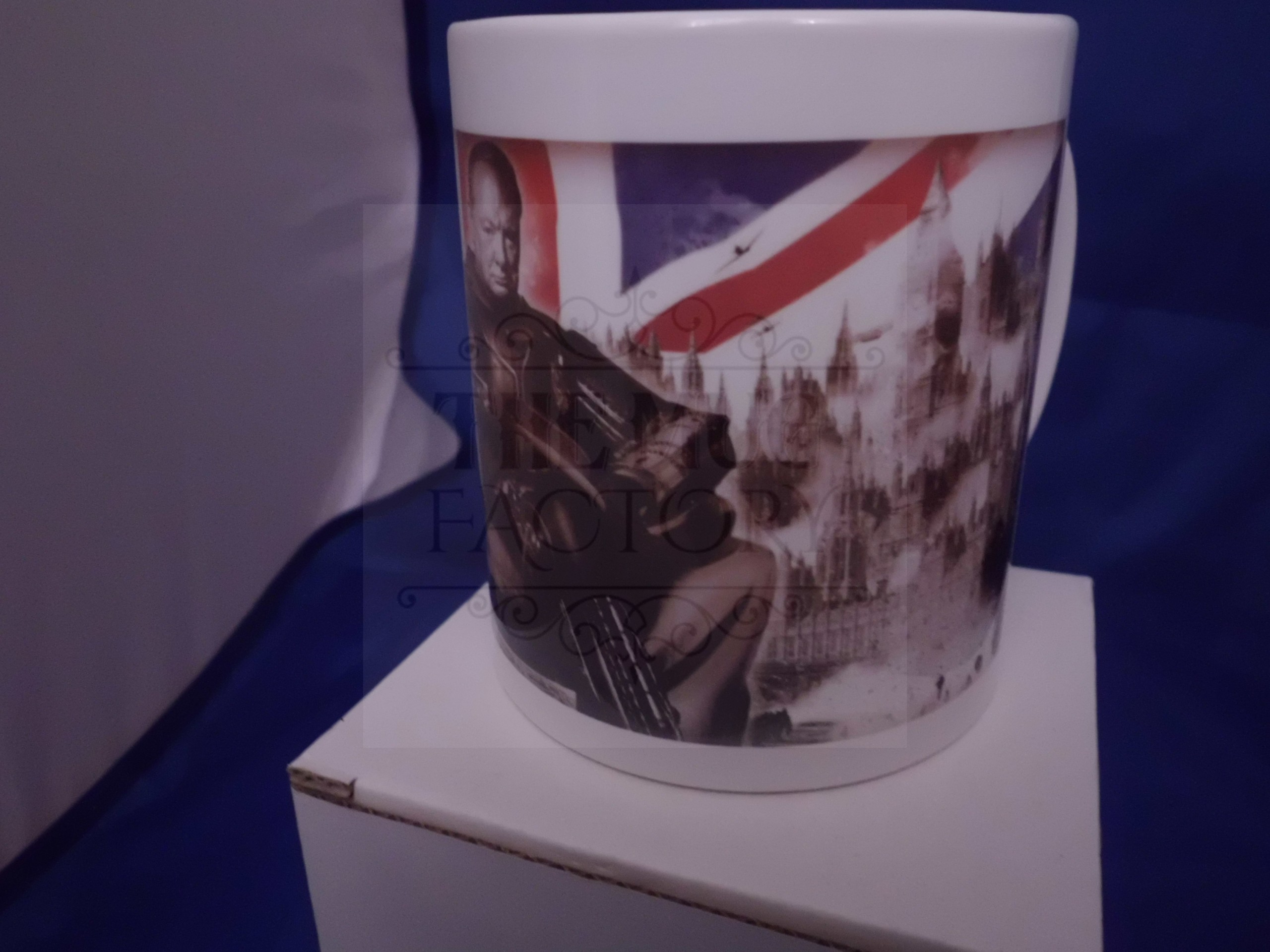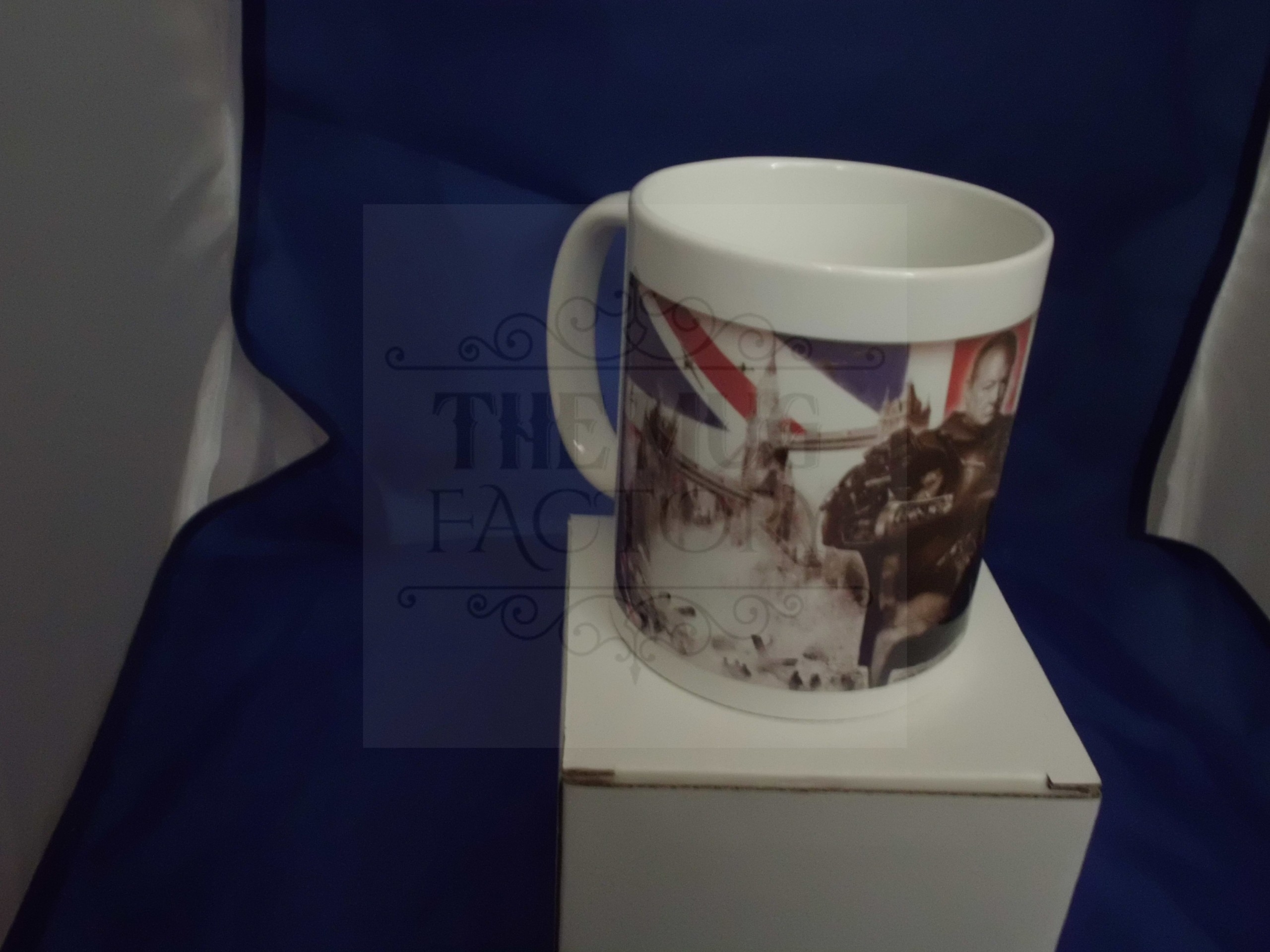Winston Churchill military mug
11oz mug
Prime minister of the United Kingdom, Sir Winston Churchill rallied the British people during WWII, and led his country from the brink of defeat to victory.
Born to an aristocratic family in 1874, Winston Churchill served in the British military and worked as a writer before going into politics. After becoming prime minister in 1940, he helped lead a successful Allied strategy with the U.S. and Soviet Union during WWII to defeat the Axis powers and craft post-war peace. Elected prime minister again in 1951, he introduced key domestic reforms. Churchill died at age 90 in 1965.
Early Life
Winston Leonard Spencer-Churchill was born to an aristocratic family on November 30, 1874. As his life unfolded, he displayed the traits of his father, Lord Randolph Churchill, a British statesman from an established English family, and his mother, Jeanette "Jennie" Jerome, an independent-minded New York socialite.
As a young child, Churchill grew up in Dublin, Ireland, where his father was employed by his grandfather, the 7th Duke of Marlborough, John Spencer-Churchill. When he entered formal school, Churchill proved to be an independent and rebellious student. He did poorly at his first two schools and in April 1888, he was sent to Harrow School, a boarding school near London. Within weeks of his enrollment, he joined the Harrow Rifle Corps, which put him on a path to a military career.
At first it didn't seem the military was a good choice for Churchill. It took him three tries to pass the exam for the British Royal Military College. However, once there, he did well and graduated 20th in his class of 130. Up to this time, his relationship with both his mother and father was distant, though he adored them both. While at school, Churchill wrote emotional letters to his mother, begging her to come see him, but she seldom came. His father died when he was 21, and it was said that Churchill knew him more by reputation than by any close relationship they shared.
Churchill enjoyed a brief but eventful career in the British Army at a zenith of British military power. He joined the Fourth Hussars in 1895 and served in the Indian northwest frontier and the Sudan, where he saw action in the Battle of Omdurman in 1898. While in the Army, he wrote military reports for newspapers The Pioneer and the Daily Telegraph, and two books on his experiences, The Story of the Malakand Field Force (1898) and The River War (1899).
In 1899, Churchill left the Army and worked as a war correspondent for the Morning Post, a conservative daily newspaper. While reporting on the Boer War in South Africa, he was taken prisoner by the Boers while on a scouting expedition. He made headlines when he escaped, traveling almost 300 miles to Portuguese territory in Mozambique. Upon his return to Britain, he wrote about his experiences in the book London to Ladysmith (1900).
Government and Military
In 1900, Churchill became a member of Parliament in the Conservative Party for Oldham, a town in Manchester. Following his father into politics, he also followed his father's sense of independence, becoming a supporter of social reform. Unconvinced that the Conservative Party was committed to social justice, Churchill switched to the Liberal Party in 1904. He was elected a member of Parliament in 1908, and was appointed to the prime minister's cabinet as president of the Board of Trade. That same year, he married Clementine Ogilvy Hozier, after a short courtship.
As president of the Board of Trade, he joined newly appointed Chancellor Lloyd George in opposing the expansion of the British Navy. Also in 1908, he introduced several reforms for the prison system, introduced the first minimum wage, and helped set up labor exchanges for the unemployed and unemployment insurance. Churchill assisted in the passing of the People's Budget, which introduced new taxes on the wealthy to pay for new social welfare programs. The budget passed the House of Commons in 1909, but was initially defeated in the House of Lords, before being passed in 1910. He also drafted a controversial piece of legislation to amend the Mental Deficiency Act of 1913, mandating sterilization of the feeble-minded. The bill eventually passed both Houses with only the remedy of confinement in institutions.
In January 1911, Churchill showed his tougher side when he made a controversial visit to a police siege in London. Police had surrounded a house where two robbers had been caught. Churchill's degree of participation is still in some dispute. Some accounts have him going to the scene only to see for himself what was going on; others state that he allegedly gave directions to police on how to best storm the building. What is known is that the house caught fire during the siege and Churchill prevented the fire brigade from extinguishing the flames, stating that he thought it better to "let the house burn down," rather than risk lives rescuing the occupants. The bodies of the two robbers were found inside the charred ruins.
While serving as first lord of the Admiralty, Churchill helped modernize the British Navy, ordering that new warships be built with oil-fired instead of coal-fired engines. He was one of the first to promote military aircraft and set up the Royal Navy Air Service. So enthusiastic was he about aviation that he took flying lessons to understand firsthand its military potential. Though not directly involved in the disastrous Battle of Gallipoli, Churchill resigned his post because he felt responsible for proposing the expedition. For a brief period, he rejoined the British Army, commanding a battalion of the Royal Scots Fusiliers on the Western Front and seeing action in "no man's land." In 1917, he was appointed minister of munitions for the final year of the war, overseeing the production of tanks, airplanes and munitions.
From 1919 to 1922, Churchill served as minister of war and air and colonial secretary under Prime Minister David Lloyd George. As colonial secretary, Churchill was embroiled in another controversy when he ordered air power to be used on rebellious Kurdish tribesmen in Iraq, a British holding. At one point, he suggested that poisonous gas be used to put down the rebellion. This proposal was considered but never enacted, though the conventional bombing campaign was and failed to end the resistance.
Fractures in the Liberal Party led to the defeat of Churchill as a member of Parliament in 1922, and he rejoined the Conservative Party. He served as chancellor of the exchequer, returning Britain to the gold standard, and took a hard line against a general labor strike that threatened to cripple the British economy. With the defeat of the Conservative government in 1929, Churchill was out of government. He was perceived as a right-wing extremist, out of touch with the people. He spent the next few years concentrating on his writing and published A History of English Speaking Peoples.
World War II
Though not at first seeing the threat that Adolf Hitler posed when he rose to power in 1933, Churchill gradually became a leading advocate for British rearmament. By 1938, as Germany began controlling its neighbors, Churchill had become a staunch critic of Prime Minister Neville Chamberlain's policy of appeasement toward the Nazis.
On September 3, 1939, the day that Britain declared war on Germany, Churchill was appointed first lord of the Admiralty and a member of the war cabinet, and by April 1940, he became chairman of the Military Coordinating Committee. Later that month, Germany invaded and occupied Norway, a setback for Neville Chamberlain, who had resisted Churchill's proposal that Britain preempt German aggression by unilaterally occupying vital Norwegian iron mines and sea ports.
In May, debate in Parliament on the Norwegian crisis led to a vote of no confidence toward Prime Minister Chamberlain. On May 10, King George VI appointed Churchill as prime minister and minister of defense. Within hours, the German Army began its Western Offensive, invading the Netherlands, Belgium and Luxembourg. Two days later, German forces entered France. Britain stood alone against the onslaught.
Churchill’s Article “Are We Alone In The Universe?”
Keep in mind that at the time he wrote this article, “Are We Alone In The Universe?,” significantly less information regarding UFOs and ETs was available than there is today. Through disclosure, channellings, whistleblowers, and public sitings, we have gained much more information proving the existence of ET life.
His first draft was published in London’s News of the World newspaper in 1939 and was then slightly revised in the 50s and republished. The article touches on the Fermi Paradox, which you can read about in our CE article here. The Fermi Paradox essentially tries to answer the question, “Do extraterrestrials exist and if so, why aren’t we freely communicating with them all the time?”
There are numerous potential answers to this question; however, it’s important that you understand that we have been visited before. More than a dozen NASA astronauts have publicly stated that UFOs have been spotted, including Dr. Edgar Mitchell and Princeton University Physics Professor Brian O’Leary (read some of their statements here).
The chairman of Hillary Clinton’s 2016 presidential campaign, John Podesta, has also been quoted many times discussing the lack of UFO disclosure, as have many other politicians. There is so much information out there to support the idea that ETs have been visiting us, and if you’re unfamiliar with it you can start by reviewing the exopolitics
In regards to Churchill’s essay, he took a fairly scientific stance on the matter, first discussing that “all living things of the type we know require water,” which often guides our search for ET life. He also pointed out that known life can only exist “between a few degrees of frost and the boiling point of water” and goes on to explain how Earth’s temperature is fixed by its distance from the sun.
He states, “the sun is merely one star in our galaxy, which contains several thousand millions of others.”
“But this speculation depends upon the hypothesis that planets were formed in this way. Perhaps they were not. We know there are millions of double stars, and if they could be formed, why not planetary systems?,” he asks.
Churchill continues, “I am not sufficiently conceited to think that my sun is the only one with a family of planets.” A large fraction of extrasolar planets “will be the right size to keep on their surface water and possibly an atmosphere of some sort” and some will be “at the proper distance from their parent sun to maintain a suitable temperature.” In other words, they would be able to house life very similar to that which thrives on planet Earth.
He concludes by saying, “with hundreds of thousands of nebulae, each containing thousands of millions of suns, the odds are enormous that there must be immense numbers which possess planets whose circumstances would not render life impossible.” (source)
There are at least 500-quintillion (or 500 billion billion) sun-like stars out there, and that’s a very conservative estimate. A study from the Proceedings of the National Academy of Science suggests that at least 1% of the total stars in the universe have Earth-like planets orbiting around them, meaning that 100 billion billion Earth-like planets may exist.
For those of you who are skeptical about extraterrestrials, let’s make a conservative estimate that after 1 billion years of existence, only 1% of these Earth-like planets develop life. To help you visualize this, that would be the equivalent to every single grain of sand on Earth representing one planet with life on it. Even if only 1% of that number developed equal intelligence to humans, that would mean there are 10 million billion intelligent civilizations in the universe.
If you scale these numbers down using the same estimates to predict how many intelligent civilizations exist in the Milky Way, you’d get 1 billion Earth-like planets and 100,000 intelligent civilizations in our galaxy alone.
Given the significant amount of evidence for UFOs and the channellings I’ve seen of extraterrestrials, I am fully confident that not only do these beings exist, but they have in fact visited us as well. To assume otherwise would simply be ignorant. The governments know this, Churchill knew this, and you should too!
Why Churchill Ordered a UFO Cover-Up
Files released in 2010 by the U.K. Ministry of Defense suggest that former Prime Minister Winston Churchill ordered a UFO cover-up during World War II. Amongst the 5,000 pages of correspondence between the public and British authorities regarding UFO sightings exists a letter that discusses a meeting between Churchill and U.S. General Dwight D. Eisenhower.
The declassified letter is from 1999, and it states that the two leaders were briefed on a UFO incident reported by a Royal Air Force (RAF) bomber crew. While traveling back from Germany, the crew allegedly spotted a metal UFO and even took pictures of it.
“This event should be immediately classified since it would create mass panic amongst the general population and destroy one’s faith in the Church,” Churchill allegedly said. The letter reveals that Churchill requested that the information be kept secret for at least 50 years.
The archives also show that this wasn’t a rare occurrence at the time; in 1957, reports proved that there was, on average, one UFO sighting per week (source).
Dr. David Clarke, a UFO consultant to the National Archives, explained why the papers were only being released now, stating, “Since the Freedom of Information Act arrived in 2005, this subject – UFOs – have become the third-most popular subject for people to write to the Ministry of Defence saying ‘please could you release this file, or papers that you hold on this particular case.’ “
It should be noted that a lot of UFO documents are likely missing from these files. When the Ministry of Defense was asked to address this, they stated that prior to 1967, all UFO files were destroyed after five years. Thus, any UFO files around the time of World War II would likely have been destroyed.
It’s no secret that governments try to hide UFOs from the public, but that could, in a way, be a good thing. Maybe we aren’t ready to contact ETs regularly until we reach a higher state of consciousness, access higher dimensions, and become a more intelligent, peaceful civilization. However, I do believe that through information disclosure, we can awaken a deeper state of consciousness within us and raise our vibration as a collective.
I’ll end this article with a fascinating quote by Winston Churchill that reads: “In wartime, truth is so precious that she should always be attended by a bodyguard of lies.”
Churchill’s reasoning behind keeping UFO disclosure at a minimum could have been because he didn’t want to bring more darkness to an already very dark part of history. Sometimes, we aren’t all ready to come into knowledge at the same time, and perhaps Churchill understood this.









